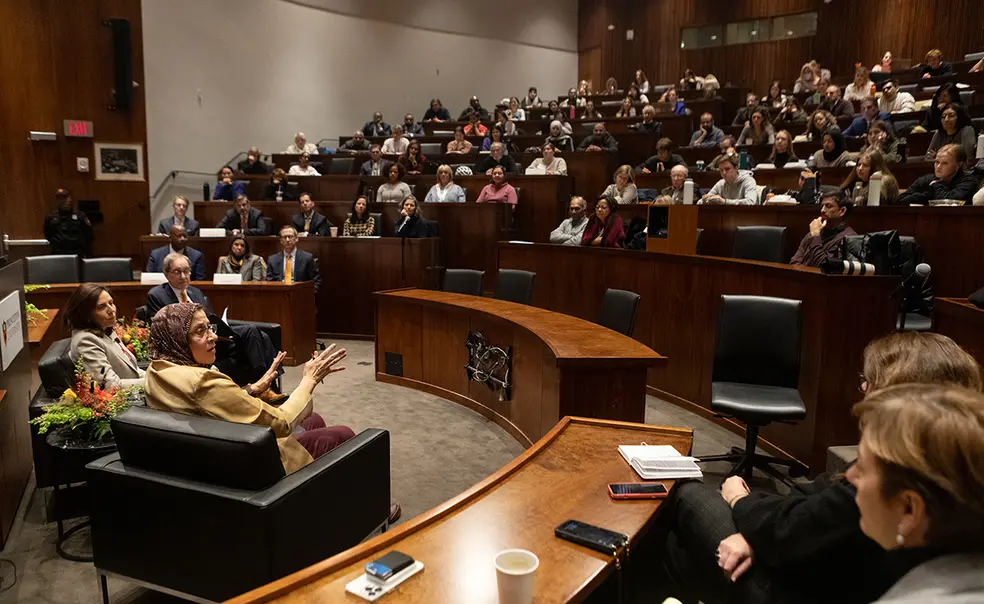Princeton, Columbia Deans Aim to Educate With Talk on Israel, Palestine
In the “difficult conversation,” Amaney Jamal and Keren Yarhi-Milo said campuses are at a crossroads
Amid a tumultuous semester of often polarized demonstrations by pro-Palestinian and pro-Israeli groups on college campuses, Amaney Jamal, the Palestinian American dean of Princeton’s School of Public and International Affairs, and Keren Yarhi-Milo, the Israeli American dean of Columbia’s School of International and Public Affairs, penned an Oct. 30 New York Times op-ed calling for universities to be centers of free speech and “hold difficult conversations without fear of retaliation.”
This week, Jamal and Yarhi-Milo put some of their ideas into practice, discussing the current Israeli-Palestinian conflict, the history of diplomacy in the region, and the role universities can play in adding nuance to the discourse at a pair of public conversations, Nov. 28 at Princeton and Nov. 30 at Columbia.
The Princeton talk, moderated by President Christopher Eisgruber ’83, drew about 200 people to Robertson Hall’s Arthur Lewis Auditorium and 465 more who watched via livestream.
Yarhi-Milo, a former associate professor of politics and international affairs at Princeton, said that she and Jamal wrote the op-ed at a time when colleges seemed to have reached a crossroads.
“Really, it was a moment where I felt either that universities are going to become irrelevant and will allow social media or other actors to capture the discourse and continue with very polarizing discourse, or we can step in and use this moment to talk about the conflict, bring more knowledge, understanding, perspective, and civil dialogue,” she said.
Jamal added that on college campuses, people should be able to speak about a range of perspectives, both popular and unpopular. “If we can’t do that in our universities, then where are we going to be able to do that?” she said.
While both deans recognized the role of campus protests and the need to protect free speech and free assembly, they stressed the need to also have face-to-face discussions — in classrooms and in other forums — that go beyond chants and slogans.
Eisgruber raised the issue of one particular slogan that pro-Palestinian groups have chanted during rallies at Princeton and elsewhere, “From the river to the sea, Palestine will be free,” which many see as a call for the destruction of the state of Israel.
Jamal, who spent part of her formative years living in the West Bank, said the slogan was popular prior to the 1993 Oslo Accords, but “once the Palestinians entered into negotiations with Israel and the recognized the state of Israel and they denounced terrorism, that slogan was not used on [the] popular Palestinian street.” She said that some students have objected to the deans’ op-ed, in which they cited the chant as an example of “an environment lacking in sophistication and nuance.” Students told Jamal they were not calling for the destruction of Israel, and that to stop using the slogan might be seen as “capitulating” to those who’d objected to it. Yarhi-Milo said that regardless of the intent of those chanting, the phrase is offensive to many Jewish and Israeli students.
The Princeton event ended with a brief Q&A period that included one student asking how pro-Palestinian students are supposed to engage in civil conversation when they are continually met with what they see as incivility. Jamal said that Palestinians often are “dehumanized” in the media, and that promoting a better future requires calling out toxic discourse on both sides.
Eisgruber, following Jamal’s remarks, said, “I certainly agree with our deans and with the student questioner that free speech has to embrace the strong expression of opinions on all sides of a controversial issue, and it’s really important to elevate that conversation. But I think the right way to elevate it is by further conversations like this one … rather than the suppression of speech.”
The second talk, at Columbia, covered much of the same ground. Moderated by Claire Shipman, an ABC News correspondent and co-chair of Columbia’s board of trustees, the event touched on issues of policy, including the role that the United States and other nations may play in a political solution to the conflict in Gaza.
Jamal also opened up about the experience of being doxxed in Princeton by a group calling itself Alums for Campus Fairness. The group sent a truck around town featuring an electronic sign that accused Jamal of failing to denounce the Hamas terror attacks. When it learned that Jamal had already denounced Hamas, the group apologized privately.
“The doxxers apologized because they made a mistake,” Jamal said. “And I asked him, well, can you come apologize with the same truck and put it in the middle of the town for three days and, you know, chase me around with it? Of course, they didn’t do that.”
She added that the incident was alarming to Palestinian and Muslim students who wondered, “if they came after an established dean at one of the best schools in the country … what does it mean for me? I am powerless.”
“These outside groups that have targeted our universities in ways that are just fomenting hate and vitriol and disempowering our students [are] really something that we need to have a conversation about as universities,” Jamal said. “This is not healthy.”












No responses yet